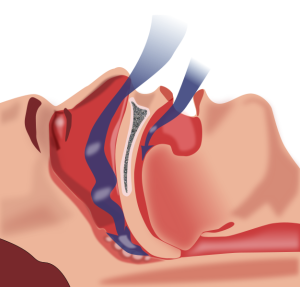Difference between Snoring and Apnea

Illustration of obstruction of ventilation
Snoring vs Apnea
Snoring is the hoarse sound that occurs when your breathing is partially obstructed in some way while sleeping. Apnea means total stoppage or suspension of breathing temporarily for few seconds due to complete obstruction of air passage. Snoring is an abnormal sound whereas apnea is a sleep disorder. Snoring is an alarming symptom indicating patient might be suffering from sleep apnea but not all snorers suffer from sleep apnea.
Snoring occurs when air passes through relaxed muscles and tissues surrounding the throat, causing the tissues to vibrate which creates the irritating sound. While snoring, sound production is most often from the soft palate. Snoring during sleep is the first alarming sign for obstructive sleep apnea. Generally, structures involved in snoring are uvula and soft palate. Irregular airflow is usually due to blockage in the air passage due to reasons such as nasal obstruction due to polyp, septum deviation; throat muscle weakness causing the throat to close during sleep; malpositioned jaw; deposition of fat around the throat; drinking alcohol; certain drugs such as sedatives that induce sleep; sleeping position – sleeping on back produces more sound as compared to sleeping on sides.
Obstructive sleep apnea occurs when soft tissues in the throat repeatedly collapse and block the airway during sleep. When you are asleep these muscles relax and the tongue falls back on the airway tract, stopping the air entry and breathing. This is called as apnea; it is temporary lasting 10 seconds or more, till the brain senses that oxygen levels have dropped alerting you to wake up. This cycle recurs multiple times in sleep apnea, where patients wake up, breathe normally, the cycle reverses and they fall asleep again. They often make gasping sounds when airway reopens. Most people with sleep apnea snore loudly with periods of silence when airflow is reduced or blocked.
Snoring causes a nuisance to the partner and people sleeping in the surrounding. Most people in mid 40’s snore, the most common reason being obesity. Not all patients who snore suffer from any disease but loud snoring is definitely associated with the development of carotid artery atherosclerosis, the risk of brain damage and stroke.
Common symptoms seen in obstructive sleep apnea are excessive sleepiness during the day because of discontinuous sleep at night, anxiety, depression, inability to concentrate, irritability, forgetfulness, mood or behavior changes, morning headaches and decreased interest in sex. Diagnosis is generally made on the basis of history and examination. Diagnostic test called sleep study or polysomnogram is performed at sleep centers or at home when the patient is asleep. It measures breathing activity, brain activity, heart rate and blood pressure.
Treatment of snoring generally involves lifestyle modification i.e. losing weight in obese persons, avoiding alcohol & smoking, avoiding sedatives, and changing sleep position to sides. If a patient is suffering from sleep apnea, then use of CPAP i.e. continuous positive airway pressure machine is the treatment. The patient wears a mask over the mouth and nose and air is forced into the upper airway through a blower; pressure is adjusted so that it maintains oxygen level in the blood. Surgery is the last option if adenoids or tonsils are the cause of obstruction or oral surgery if malpositioned jaw is the cause.
SUMMARY: Snoring is a noise produced due to airway obstruction whereas sleep apnea is a respiratory condition. Snoring can be an alarming symptom for sleep apnea. Snoring occurs due to partial obstruction in the airway where as apnea occurs due to complete obstruction. Snoring increases the risk of coronary artery atherosclerosis in long run. Snoring and sleep apnea are both treatable.
- Difference between near sightedness and far sightedness - January 21, 2015
- Difference between Diverticulosis and Diverticulitis - January 20, 2015
- Difference between Prilosec and Nexium - January 19, 2015
Search DifferenceBetween.net :
 Email This Post
: If you like this article or our site. Please spread the word. Share it with your friends/family.
Email This Post
: If you like this article or our site. Please spread the word. Share it with your friends/family.


There is also central sleep apnea, which doesn’t involve any obstruction and doesn’t necessarily include snoring as a symptom.Central sleep apnea occurs because your brain doesn’t send proper signals to the muscles that control your breathing. With central sleep apnea the brain fails to send the proper signals to keep the body breathing.
My first time knowing of the same.
Thanks for your information ! It is very useful. I know that CPAP Chine is 1 of method to cure sleep apnea. How about the others?
Very Useful Information
Thanks for Sharing